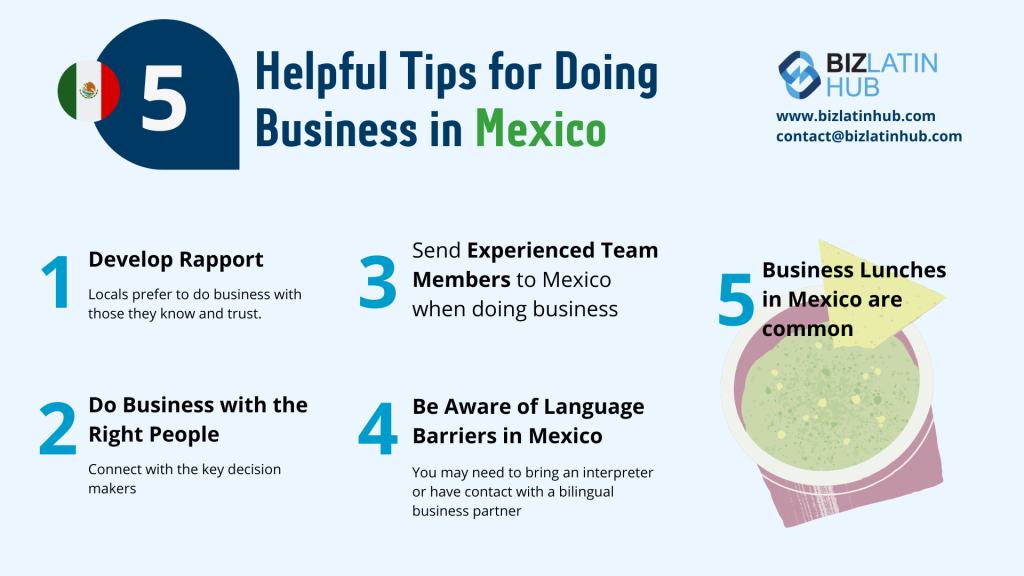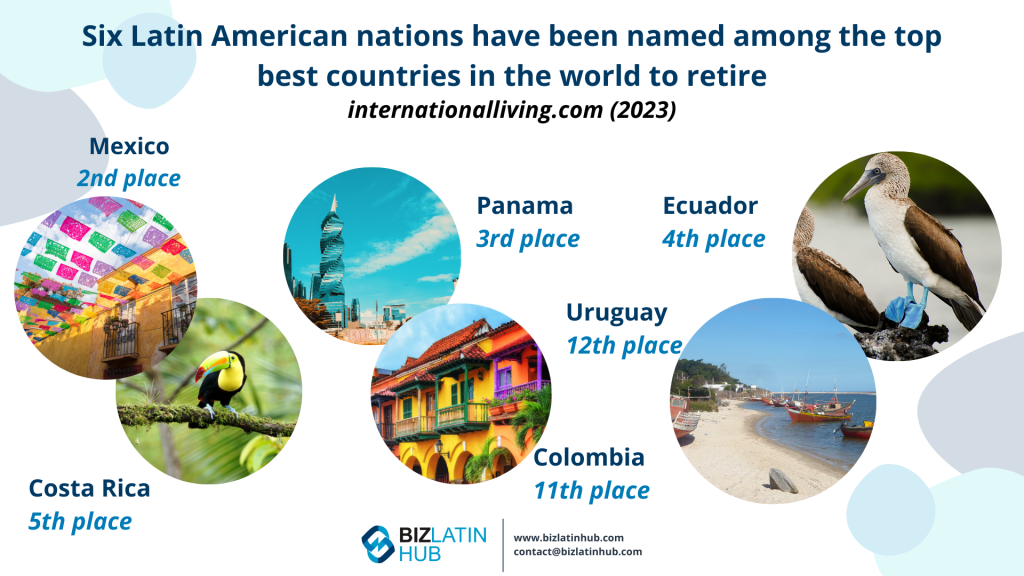Expanding isn’t just about understanding legal and technical requirements for forming a company; you must be attentive to cultural differences driving your new partners and customers to guarantee commercial success in Latin America. As connections to the region are increasing, we offer guidance on some key cultural aspects to be aware of in general when doing business in the region. Biz Latin Hub knows all about commercial success in Latin America and we can help you achieve the same results across the area via our network of dedicated local offices.
Key takeaways on business etiquette in Latin America
| Do you need to build relationships in Latin America? | A great deal of importance is placed on building personal relationships and knowing who you are doing business with. |
| How important is punctuality in Latin America? | Ignore the stereotypes and make sure you do things on time to make a good impression. |
| What style of negotiation is best to use? | Be prepared to negotiate and commercial success in Latin America requires patience when doing so. |
| Do you need to use the local language? | Clear communication in English as well as the local language will help both with business matters and with building those personal relationships. |
| Be respectful | Many Latin American countries suffer a great deal of prejudice and all are fiercely proud of their country. Take the time to learn a little about the country and region and avoid making criticisms. |
| How formal is Latin America? | Err on the side of caution, both in language and dress. Honorifics are frequently used and business attire is expected. |
1. Take care with names and titles
Compared to some English-speaking countries, Latin American workplaces are more status conscious. Take care in acknowledging someone’s title or role. People can often address people by their title in the workplace. Show your respect for people’s positions and level of authority.
In turn, expect to receive greetings of the same nature – this can be especially surprising for people accustomed to addressing others on first name basis in the workplace. Gauge receptiveness to that kind of interaction carefully; you may be disrespecting someone by bypassing formal acknowledgment of their standing in the company.

2. Hugs and air kisses are normal
If your traditional greeting is a handshake, you’ll need to adjust to a more tactile connection when meeting people. In business and social environments, it’s normal for men and women alike to greet with a hug and/or air kiss.
Failing to greet with warmth can be interpreted as standoffishness or disinterest. Being aware of the differences in the way people treat personal space in this manner is important to moving ahead on the right foot when meeting new people. The personal ‘bubble’ is less defined than in other countries, so be aware that backing away from someone who stands near could be considered rude.
3. Build relationships for commercial success in Latin America
In other business environments, compelling pitches, major investments, and comprehensive strategies win over peers and partners in the workplace. In Latin America, businesses must make relationship building their utmost priority.
Foreign businesspeople must be aware that business isn’t conducted in the same impersonal manner here in Latin America. Where they are used to focusing on deliverables, Latin businesses place a greater value on working relationships.
A client or business partner won’t sign with someone they don’t feel they can trust. Building rapport and establishing close ties with stakeholders and prospective investors shows you care about their opinion. Openness shows your willingness to align with their values and strategic direction.

4. Show warmth and expression
Personal boundaries aren’t as rigid in Latin American business culture as they are in much of the English-speaking world. Latin Americans are warm and friendly, including in work environments. This can be quite a change to Western compartmentalization of individuals’ work and personal lives.
Be prepared to receive inquiries about your health, family, and other relationships. Opening up about who you are as a person enables quicker relationship-building. Build trust with your co-workers and business partners by sharing deeper conversation topics than the weather.
5. Business attire is formal when doing business
Dress formally for work in Latin America and for business meetings. ‘Smart casual’ won’t make the cut in many work situations. Looking the part shows that you’re committed to making a good impression and representing yourself and your business partners. Formal business attire also encourages the perception of authority; dressing too casually might lead your counterparts to believe you have no decision-making ability in your role.
Unless you’ve been told otherwise, expect to dress in professional, modern business attire. Men – make sure to put on a tie.
6. Different dynamics in meetings and negotiations
Business meetings often mix the personal with the professional in Latin America. Meetings may spill into overtime by up to an hour; small talk and casual conversation is important to keep things light and engaging. Launching straight into talking shop sends the wrong signals, and really makes ‘work’ of meetings. It’s not uncommon to meet over lunch for a couple of hours. Remember, warm working relationships sit at the core of business success in Latin America.
Negotiations won’t necessarily close quickly or stick to schedule. Latin Americans may approach things in a more indirect way than some Western business climates. There’s an expectation that negotiations should be done face-to-face, instead of over the phone. This means that you’ll have to factor in a longer stay in the country as opposed to a few nights. Deadlines aren’t rigid in meetings or negotiations, so budget your time accordingly and be patient.

7. Punctuality matters
In some English-speaking countries, if you’re right on time to a meeting, you’re almost late. In Latin America, that’s just as true in professional contexts. While casual appointments might be more flexible aand fluid with timings, that’s very much not the case with commerce.
Some observers note that this expectation is especially marked for foreign businesspeople; you may not get away with showing up late to a meeting, if you’re the one pitching the idea or courting a new client.
Prepare to take time in negotiating deals with your Latin American counterparts. As mentioned above, if you’re pursuing a new working relationship or partnership, it’s normal to meet over a meal and take your time getting to know your counterparts and clients.
8. Speak the lingo
Overcoming language barriers is another big hurdle foreign companies face when expanding into the country. The lack of prevalence of English makes integration difficult. It’s difficult to find bilingually-skilled workers in certain professions in some Latin American countries.
Coming prepared with proficiency in Spanish and/or Portuguese shows a dedication to integrate into the country and an awareness of Latin American culture.
FAQs on business etiquette in Latin America
These are some of the most common questions we receive from international investors interested in business etiquette in Latin America.
1. Can a foreigner own a business in Latin America?
Yes, in all jurisdictions we operate in a business can be 100% foreign-owned by either legal persons (legal entities) or natural persons (individuals).
2. Why do business in Latin America?
Latin America and the Caribbean is quickly becoming the region to watch in terms of steady economic growth, and increasing market attractiveness. Many foreign businesses and investors are snapping up opportunities to access immense populations and bring innovation to the region. However, commercial success in Latin America doesn’t come easily.
3. How long does it take to register a company in Latin America?
It takes two to 16 weeks to register and set up an operating company in Latin America, contingent upon the timely submission of all necessary documents and the sector/country you are in.
4. What does an S.R.L company name mean in Latin America?
This is similar to an LLC in other jurisdictions, usually with anything between 1 to 50 shareholders. The company name must illustrate the goods or services it provides or include the name of one or more partners. Personal liability is tied either to the value of shares held or to capital investment.
5. What does an S.A. company name mean in Latin America?
A public limited company (often called a Sociedad Anónima or S.A.) is another option for company formation in Latin America. Each shareholder is liable to the extent of their capital contribution.
6. What is the best entity type in Latin America?
We usually recommend Simplified Share Companies where they exist, but this does vary slightly depending on a variety of factors, such as the country, industry and size of company.
Find commercial success in Latin America with Biz Latin Hub
When operating in new countries, having a trusted local partner will support your growth. We can help you find commercial success in Latin America through in-depth knowledge of technical and cultural expectations.
At Biz Latin Hub, we offer a range of back-office services designed to help you understand the local market and to navigate its complexities, ensuring a successful international expansion.
To find out more about how we can help, contact us now and we’ll get back to you with a personalized strategy unique to your business and your Latin American expansion goals.






